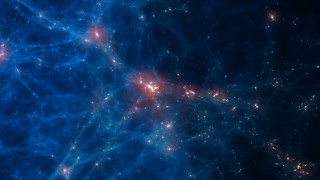Bibcode
van Son, Lieke A. C.; Barber, Christopher; Bahé, Y. M.; Schaye, Joop; Barnes, David J.; Crain, Robert A.; Kay, Scott T.; Theuns, Tom; Dalla Vecchia, C.
Referencia bibliográfica
Monthly Notices of the Royal Astronomical Society, Volume 485, Issue 1, p.396-407
Fecha de publicación:
5
2019
Número de citas
18
Número de citas referidas
17
Descripción
Massive early-type galaxies follow a tight relation between the mass of
their central supermassive black hole (MBH) and their stellar
mass (M⋆). The origin of observed positive outliers from
this relation with extremely high MBH (> 109
M_{⊙ }) remains unclear. We present a study of such outliers in the
Hydrangea/C-EAGLE cosmological hydrodynamical simulations, designed to
enable the study of high-mass galaxy formation and evolution in cluster
environments. We find 69 MBH(M⋆) outliers at
z = 0, defined as those with M_BH> 107 M_{⊙ } and
MBH/M⋆ > 0.01. This paper focuses on a
sample of five extreme outliers, that have been selected based on their
MBH and M⋆ values, which are comparable to
the most recent estimates of observed positive outliers. This sample of
five outliers, classified as `black hole monster galaxies' (BMGs), was
traced back in time to study their origin and evolution. In agreement
with the results of previous simulations for lower mass
MBH(M⋆) outliers, we find that these galaxies
became outliers due to a combination of their early formation times and
tidal stripping. For BMGs with M_BH> 10^9 M_{⊙ }, major mergers
(with a stellar mass ratio of μ > 0.25) at early times (z > 2)
precede the rapid growth of their supermassive BHs. Furthermore, the
scatter in the relation between MBH and stellar velocity
dispersion, σ, correlates positively with the scatter in
[Mg/Fe](σ). This indicates that the alpha enhancement of these
galaxies, which is closely related to their star formation history, is
related to the growth of their central BHs.
Proyectos relacionados

Astrofísica Numérica: Formación y Evolución de Galaxias
Entre las cuestiones fundamentales en Astronomía y Astrofísica están la formación y evolución de galaxias. Las escalas de tiempo y tamaño son tan astronómicas que su observación en galaxias individuales es imposible. Solo con el uso de simulaciones numéricas es posible entender la formación de estructuras cósmicas dentro del actual marco
Claudio
Dalla Vecchia